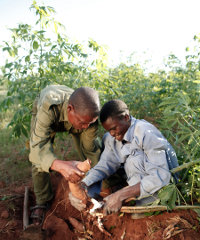Six companies investing in African agribusiness, and what we can learn from them
Africa’s agriculture and food industries are attracting increasing interest from investors. This trend is largely fuelled by the fact that the continent has 60% of the world’s uncultivated arable land, with favourable weather conditions in many countries. There is also a belief that rising incomes will spur demand for food products in the years to come. To examine the opportunities and challenges on the continent, How we made it in Africa looks at six companies that have invested in the region’s agribusiness sector.
Cassava is one of Africa’s most widely grown crops, but has not been a great commercial success. A Nigerian company, Thai Farm, has, however, achieved success by producing cassava flour.
Silk Invest – betting on food
Silk Invest is a United Kingdom-based frontier market investment company. The firm manages the Silk African Food Fund, which is a private equity fund that invests in processed food, beverages and quick-service restaurant companies on the continent.
Silk Invest sees opportunities in targeting the African consumer from a food and beverages perspective. The fund invests in scalable food companies with the potential to become national and regional leaders.
A significant volume of the packaged food that Africa consumes is currently being imported, creating opportunities to produce these products locally. In a 2011 webcast, Waseem Khan, Silk Invest’s head of private equity, gave the example of Ethiopia, which he said is a large consumer of biscuits. More than 50% of the biscuits consumed in Ethiopia is currently imported. Khan noted that there is a small company based in the Middle East that quadrupled its earnings when it started exporting biscuits to Ethiopia.
Silk Invest’s fund is currently focusing on Kenya, Ethiopia, Egypt, Morocco, Ghana and Nigeria. The fund has so far invested in a confectionary company in Egypt, a quick service restaurant brand in Nigeria, and a biscuit manufacturer in Ethiopia.
Silk Invest believes there is currently a formalisation of food products happening in Africa – a move to branded and better packaged items. “It is about a formalisation of something that is already consumed. It is basically moving from fresh milk directly from the farmer, to fresh milk in a bottle. The price typically does not change, what is changing is the packaging,” said the firm’s CEO Zin Bekkali.
He added that by selling products in improved packaging, many food companies on the continent have been able to grow their revenues by between 20% and 30% annually.
It is often difficult and expensive for African companies to borrow money from banks, and therefore private equity offers an alternative for them to grow their businesses. Khan, however, said that it is important to show these companies that Silk Invest is not there to take over their companies, but to help them grow. “Our view is to be involved in active management with them, and to be there with them for the next three to four years, where they can make money, and we can make money,” he noted.
AGCO – taking advantage of the trend towards mechanisation
Suppliers of agricultural equipment are also looking to Africa as a new growth market. AGCO, a New York Stock Exchange listed multinational company – that designs, manufactures and distributes agricultural machinery such as tractors and harvesters – last year announced that it will invest US$100 million into Africa. AGCO is the world’s third largest agricultural equipment maker and a manufacturer of brands such as Challenger, Massey Ferguson and Fendt.
AGCO’s push into the continent is mainly because it believes African agriculture is drawing growing interest from international investors, attracted by the shift to commercial farming. According to Nuradin Osman, AGCO’s director for Africa and the Middle East, there are three reasons why the company is optimistic about the continent’s agricultural sector. These are:
- Global factors such as rising populations, increasing income levels in emerging markets, and a growing scarcity of arable land and water.
- The World Bank attributes 60% of the world’s uncultivated land to Africa, and also suggests that investment in agriculture has the potential to create millions of jobs on the continent.
- About 10% of cropped land in Africa is prepared by tractor, and only 4% of land is irrigated.
In addition to large-scale commercial farms, AGCO is also targeting smallholder farmers. The vast majority of African farmers are smallholders, and most agricultural companies have some kind of strategy to also cater for their demands. However, most of these small-scale farmers cannot afford tractors and other equipment. To address this, AGCO is partnering with local and regional banks, as well as various development organisations, to provide financing solutions to these farmers. The company is also looking at leasing tractors to farmers.
AGCO also sees value in partnering with local companies in Africa. “There are numerous other benefits for being part of a joint venture with a local partner in Africa. We benefit from the local partner’s knowledge about the country’s culture, language, political system, and business systems. Since a joint venture also entails a significant equity investment, both companies invest significantly in resources, talents, and commitment to the new firm. This provides both companies with advantages in terms of sharing development costs and risks,” said Osman in an interview.
He added that joint ventures have less chance of being nationalised, as the local company also has a significant stake in the business.

